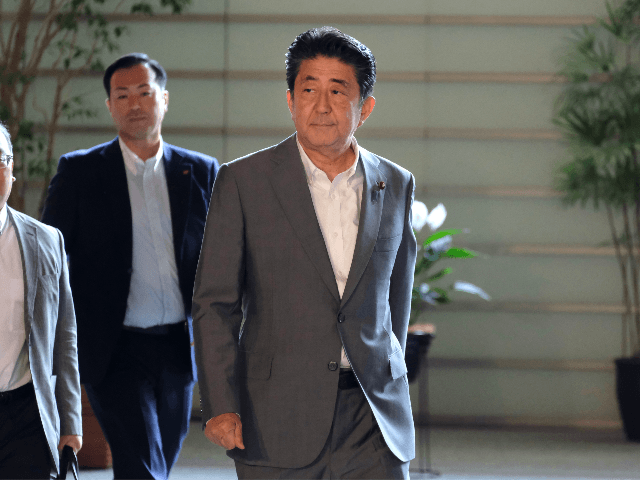Multiple Japanese newspapers, citing unnamed police “sources,” reported on Saturday that the man arrested on charges of having assassinated former Prime Minister Abe Shinzo said he initially wanted to kill the leader of an unnamed “religious” group but found it more difficult than targeting Abe.
Abe was the longest-serving prime minister in Japanese history and one of the country’s most powerful and respected figures. Supporters credit him with implementing a program, dubbed “Abenomics,” that kick-started a stagnant national economy through massive government spending and the promotion of welcoming women into the workforce. Abe was also a nationalist leader who invested much of his energy in expanding Japan’s defense capabilities and supported amending the Japanese Constitution, written after World War II, to allow the country to have a military. Abe was largely a conservative leader outside of his economic policies.
Shortly before his death, following his departure from the prime minister’s office in 2020, Abe dedicated his public efforts to defending Taiwan from a potential Chinese attack and warning the world to contain Chinese communist military belligerence. Abe repeatedly stated that a Chinese attack on Taiwan would be an attack on Japan and urged the United States to abandon its ambiguous position on the island nation and, instead, vow to defend it.
Chinese social media users erupted in celebration at the news of Abe’s death on Friday. Photos surfaced throughout Weibo, China’s government-controlled social media outlet, of local Chinese businesses offering promotions and sales to celebrate Abe’s killing.
A man that reports have identified as 41-year-old Yamagami Tetsuya approached Abe from behind during a campaign stop on Friday in southern Nara, Japan, and shot him twice with what police believe is a homemade firearm. Abe was in Nara to campaign for legislative candidates in his ruling conservative Liberal Democratic Party (LDP) and had little security detail surrounding him:
Yamagami has reportedly confessed to police and confirmed that he intended to kill Abe but insisted he did not have any significant disagreements with the former prime minister’s politics. Reports on Friday contradicted early updates following the shooting claiming that Yamagami had been “dissatisfied” with Abe in some capacity.
Instead, according to multiple reports published Saturday, Yamagami sought to avenge his mother, who became bankrupt after joining a “religious organization.” The Japanese newspapers reporting alleged Yamagami quotes have not identified the “religious organization” at press time.
“My family joined that religion and our life became harder after donating money to the organization,” the Asahi Shimbun, citing “sources,” quoted Yamagami as saying. “I had wanted to target the top official of the organization, but it was difficult. So, I took aim at Abe since I believed that he was tied (to the organization). I wanted to kill him.”
Asahi cited an unnamed alleged relative of the suspect who confirmed that Yamagami’s family had been economically devastated by joining an unspecified predatory religious group or cult.
“His family fell apart due to the group,” the anonymous witness said.
The Yomiuri Shimbun, another major Japanese newspaper, published a similar quote from Yamagami.
“I made guns to kill former Prime Minister Abe. I also made a bomb. I was so determined to kill him and was stalking him in the places he visited for campaign speeches,” the version of Yamagami’s alleged police statement published by the Yomiuri Shimbun read.
That newspaper claimed that Yamgami had attended a separate campaign event where Abe spoke on Thursday in Okayama, about three hours west of Nara. Highlighting the lack of security at that stop, which transpired uneventfully, the Yomiuri Shimbun noted that “about 2,300 people had gathered at the venue, exceeding the 1,700 seats available.”
“Visitors to the Okayama City venue were required to sign in with their names and addresses. Following Friday’s shooting, the campaign staff checked the list, but Yamagami’s name was not included,” Yomiuri Shimbun reported. “No full-body scan by metal detectors was conducted at the venue. Security personnel from the Okayama prefectural police and the Metropolitan Police Department were on guard.”
In Nara, the security situation rapidly descended into chaos as the man identified as Yamagami approached Abe from behind and shot. Abe appeared to initially attempt to continue his stump speech after being shot once, but he collapsed after being hit again.
“Things like pieces of plastic came flying at me over a crowd of people. They were chunks of plastic, something in the shapes of cylinders. They were about 5 centimeters long,” an unnamed witness told the Asahi Shimbun on Friday. Multiple witnesses told that newspaper that the homemade firearm sounded like a “bomb.” One said that attendees of the event began fainting in response to the attack.
Japanese political leaders rarely rely on any significant security at campaign events or in public, partially because of the nation’s low crime rate and a sense of security believed to exist as a product of strict gun laws.
Nara police head Onizuka Tomoaki told reporters Saturday it was “undeniable” that severe security lapses had occurred to allow for Abe’s assassination.

COMMENTS
Please let us know if you're having issues with commenting.